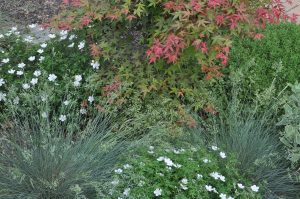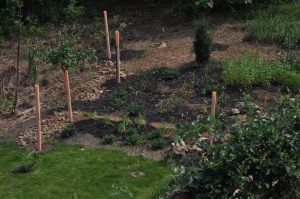Is there a time-release bit of gardener’s DNA in the human genome that wakes up when one reaches “a certain age”?
As a child and under duress from my mother I planted zinnia seeds. I didn’t particularly care for the flowers–I think Ma had some sense that they were easy to grow and that success in bringing a few blooms into being would transform me into someone who actually cared about growing things. As a twenty-something I grew vegetables. Vegetables are food, though, and cultivating them when one is un- and underemployed distracts from life’s challenges and puts dinner on the table.
No, I’m talking about serious gardening, the kind of gardening that involves digging and sweating and constant research into flowers and shrubs and trees that (in my case) will grown in a stone-and-clay matrix and survive regular depredations by the deer. I am talking about the re-creation of Eden but an Eden possible only if one has eaten well of the Fruit of the Tree of the Knowledge of Good and Evil.
My Nannie, my mother’s mother, presided over a gorgeous property with formal flowerbeds, woods, and a substantial vegetable garden. As a younger woman, Nannie got down and dirty with her landscape, but by the time I was twelve or so, Dominic the gardener did most of the heavy lifting. Nevertheless, I remember countless hours Nannie spent in the yard digging crabgrass out of her perfect green turf. I couldn’t imagine why she did it. To my eye, crabgrass pretty well matched the rest of the lawn and excavating its roots seemed a relentlessly boring endeavor.
I thought about her this morning as I worked in the shade of a small beech tree, in the area I call my “woodland garden,” pulling various weeds, including the pernicious Japanese stilt grass, from the mosses thriving in that cool, damp place. For a while I knelt, pulling with one hand and supporting myself with the other, changing back and forth every few minutes. After a while I shifted position, sitting with legs outspread, uprooting invaders, a mirror of Nannie’s pose and focus.
Nannie was a tall, beautiful woman, with longer-than-waist-length plaits of pure silver that encircled her head. She was admired for her elegance, respected for her tireless volunteerism, famed for her gracious hospitality. I was generally fearful of her, leery of her unpredictable temper, clueless as to who she really was or what she really thought.
As I teased weeds from the moss with latex-clad hand (another trait I discover I share with my mitochondrial forebears is fragile skin and a decreasing ability to heal), I felt quietly happy. The morning was hot but the shade was pleasant and breezes rippled over my head, lifting strands of sweat-soaked hair. The telephone was too distant to intrude on my awareness. My Dear One was reading or writing or cooking, engaged in a kind of parallel domestic play; he had been out earlier, watering the cucumber, tomato and pepper plants growing in big pots on the deck, safe from deer. I was happy as Nannie must have been happy: alone but hardly lonely, relieved for the moment of the burden of public identity and other people’s needs.
Maybe this is why there is a moment when the gardening gene kicks in. Maybe there gets to be a moment when we realize that there is nothing more that we want than to be simply who we are.
And I, like so many people of a certain age, have gone back to Eden.


